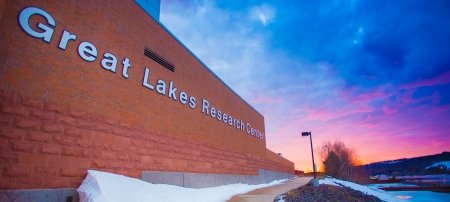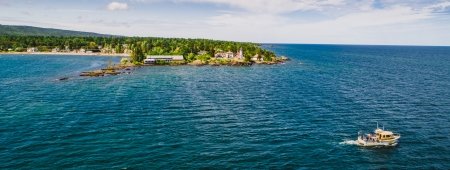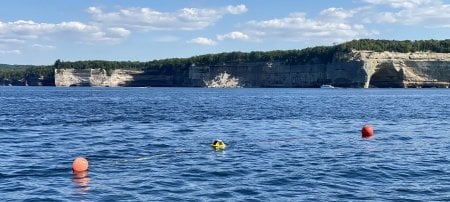Michigan Technological University will virtually host the annual conference of the International Association for Great Lakes Research in May 2021.
Please note: The IAGLR conference will be conducted virtually in 2021.
With its proximity to Lake Superior and world-class limnological research facilities, Michigan Tech is an ideal place to host the International Association for Great Lakes Research (IAGLR). The annual IAGLR conference brings together researchers who study the Great Lakes and other large lakes of the world and their watersheds. The scientific organization also includes policymakers and resource managers at municipal, tribal, state and federal levels.
The 64th Annual Conference on Great Lakes Research takes place May 17-21, 2021, on the Michigan Tech campus with field trips planned throughout the Keweenaw Peninsula. More than 700 scientists from the Great Lakes region and around the world are expected to attend. Researchers will present the latest research on topics pertaining to water quality, climate change, toxic contaminants, harmful algal blooms, fisheries, physical conditions and public health issues.

With millions living around the Great Lakes on both sides of the US-Canada border, lakes and watershed research is critical to ensure safe drinking water, protect endangered species, provide insight to fisheries managers and more.
“As a 2005 Michigan Tech civil and environmental engineering alumnus and native Yooper, I’m looking forward to bringing hundreds of scientists and policymakers who study the Great Lakes and other large lakes of the world to Michigan Tech, the Keweenaw, and the UP, a first in the history of the association,” said Ed Verhamme, recently elected president of IAGLR.
Michigan Tech has a long history of involvement in Great Lakes research and IAGLR. Two faculty members, Marty Auer (civil and environmental engineering) and Charles Kerfoot (biological sciences), have received prestigious lifetime achievement awards from IAGLR for their work. The track records of both Michigan Tech and its researchers are among the reasons the IAGLR board of directors accepted the hosting proposal from Michigan Tech faculty and co-chairs Noel Urban and Judith Perlinger.
The conference theme, “Bridging: Knowledges, Seven Generations, Land-to-Lake,” was selected by the program planning committee, which includes faculty from Michigan Tech, representatives from US and Canadian federal agencies, and representatives from tribal departments and agencies.
At the recent IAGLR 2020 meeting, Urban elaborated on the theme: “Bridges evoke the goal of connection, but also the technology involved. We intend to include sessions on new technologies that may aid our research.
"There is an urgent need for connecting people these days — across divides of race, culture and political viewpoints as well as of scientific disciplines and levels and scientific literacy."
“Among Native Americans and First Nation peoples, the concept of seven generations bridges us to our past as well as to our future; we invite retrospective analyses as well as future predictions for the Great Lakes. Of course, we cannot protect and preserve the Great Lakes for future generations without being aware of the impacts of what we do in the watersheds,” Urban said.
“IAGLR is the premier international scientific organization for research on the Great Lakes,” said Andrew Barnard, director of the Great Lakes Research Center. “With Michigan Tech situated on the shores of Lake Superior, and MTU's long history of conducting research over the entire Great Lakes basin, culminating in the formation of the Great Lakes Research Center, this is an ideal place to gather the preeminent scientists studying the hardest problems facing the lakes. Michigan Tech and the GLRC are proud to be selected as the host site for IAGLR 2021 under the organization of Drs. Noel Urban and Judith Perlinger.”
Michigan Technological University is an R1 public research university founded in 1885 in Houghton, and is home to nearly 7,500 students from more than 60 countries around the world. Consistently ranked among the best universities in the country for return on investment, Michigan's flagship technological university offers more than 120 undergraduate and graduate degree programs in science and technology, engineering, computing, forestry, business, health professions, humanities, mathematics, social sciences, and the arts. The rural campus is situated just miles from Lake Superior in Michigan's Upper Peninsula, offering year-round opportunities for outdoor adventure.






Comments